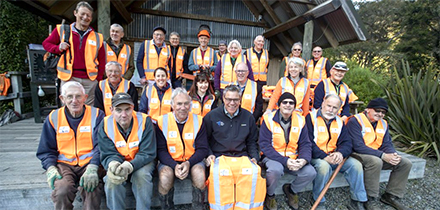
OneFortyOne Executive General Manager New Zealand, Lees Seymour with volunteers at the Brook Waimārama Sanctuary, Nelson
Volunteers at Nelson Tasman’s Brook Waimārama Sanctuary in New Zealand have received a boost with the presentation of 60 new hi-vis vests from OneFortyOne New Zealand. The company has supported the Sanctuary since 2014 with $30,000 in donations and other support in kind. Source: Timberbiz
The Brook Waimārama Sanctuary is the largest fenced mainland sanctuary in the South Island and the second largest in New Zealand. The Sanctuary is a community-based initiative that has created a wildlife haven within 5km of the Nelson city centre, consisting of 690 hectares including the entire upper Brook Valley.
Volunteers have been integral to the development of the Sanctuary, according to Brook Waimārama Sanctuary Trust chair Chris Hawkes and recognition of their efforts is very much appreciated.
“The amount of volunteer hours that people contribute is staggering,” Mr Hawkes said. “I’m not sure the city appreciates the amount of effort that goes in behind the scenes. The Sanctuary simply wouldn’t be here without volunteers.”
Mr Hawkes says that there are plenty of ways for people to become involved in the Sanctuary as a supporter, volunteer, or member. The Sanctuary is available for team days out and other events and is a popular place for tour groups, who can enjoy learning from the Sanctuary’s educator Rick Field.
Sponsorship is also very important to the Trust.
“Sanctuaries cost money to maintain, there are fences to keep intact, tracks to upkeep, weeds to control, it goes on and on. We’re very grateful for the ongoing support of companies like OneFortyOne.”
Mr Hawkes says that a recent visit from Zealandia CEO Paul Atkins was encouraging for everyone who is involved in taking the Brook Waimārama Sanctuary into the next stage of its journey.
“Paul’s view was that while we’re about 15 years behind Zealandia in terms of our development, we have more potential,” Mr Hawkes said.
“We’re much bigger, at about three times the size of Zealandia, and Paul was impressed by our mature podocarps. He considers us to be special because we have virgin beech forest within a fenced Sanctuary.”
Tom Brett has been a volunteer at the Sanctuary since 2005. Mr Brett says that he is motivated to contribute his time by a wish to leave a conservation legacy for his grandchildren and children.
“I possibly won’t see the benefits of it but they will,” Mr Brett said. “With the species extinction that’s going on this might just be one small pocket that will make a difference in the future.”
Mika Verheul and Hans Wiskerke have also contributed a great deal over their eight years as volunteers.
“The Sanctuary is a beautiful place to be and for a lot of volunteers this has become their place,” Mr Wiskerke said.
Mr Wiskerke has been the team leader of the fence maintenance crew for the past few years although the couple have turned their hands to many tasks, including helping to staff the Sanctuary’s visitor centre and its stall at the Nelson Saturday Market. Ms Verheul’s current focus is pest control. She organises the sanctuary-wide surveys checking about 2500 pest control stations every few months.
Mr Wiskerke says that while trying to create a controlled sanctuary within the natural environment certainly has its challenges it also brings many rewards.
“Once you get through the gates the birdsong is amazing,” Mr Wiskerke said.
Fellow volunteer Tony Steenhart singles out former chair Dave Butler for acknowledgement and says that the volunteers’ new vests will be a practical help for everyone as they have pockets for individuals’ names.
“I can’t always put a face to a name, especially when we have an influx of volunteers coming to help on the weekends. It also helps visitors identify the people who are associated with the Trust when we’re out and about in the Sanctuary. They can ask us questions,” he said.
The Sanctuary provides a wonderful array of activities including checking out the native weta ‘hotels’, which are very popular with younger visitors, the historic weirs and beautiful waterfalls.
There are guided or DIY walking options. A dedicated visitor centre with detailed information and interactive displays is on site to inform visitors about the Sanctuary and its work and there is also an outdoor classroom.
The Sanctuary is open to the public every Friday, Saturday and Sunday with additional open times during school holidays. Exciting events planned for the coming summer include two open days pencilled in for Saturday 24 October 2020 and Sunday 11 April 2021.
“Entry on these days will be free,” Mr Hawkes said. “And we are encouraging more of the community to come and visit the Sanctuary.”
To find out more about activities and ways to visit and get involved in the Brook Waimārama Sanctuary visit their website at www.brooksanctuary.org.nz







